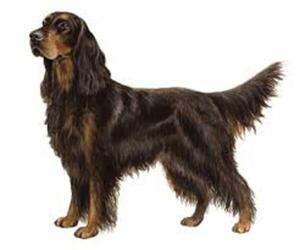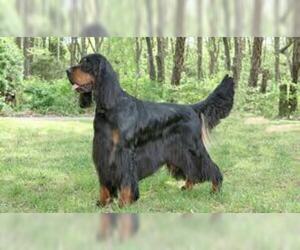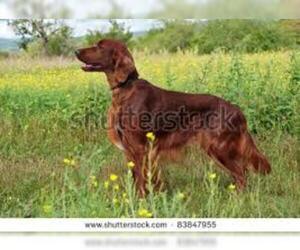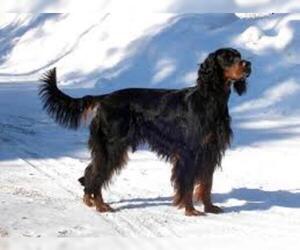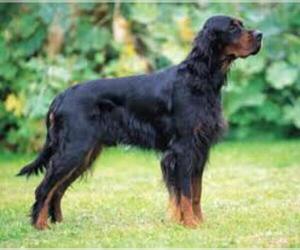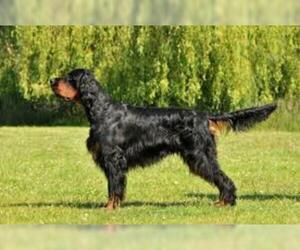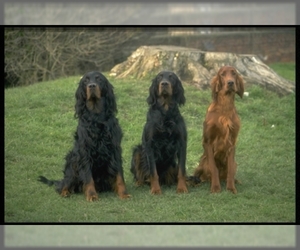
All about Gordon Setter dog breed
A.K.A. :Black-and-Tan Setter, Gordon Castle Setter, Gordons, Setter, Scottish Setter, Shorthair Setter
Size
Grooming requirements
Exercise requirements
Good with other dogs
Watchdog ability
Energetic
Training requirements
Playful
Affectionate
Good with other pets
Good with children
Good with strangers
Winter
Summer
Healthiness
Protective
Life Span
| Pure Breeds | Member |
| Breeds A - Z | G |
| Breeds by Group | Gun Dog Sporting |
| Breeds by Trait | Good With Kids High Stamina Dog Breeds |
| Overview: | The Gordon Setter is a striking and intelligent breed, originating in Scotland during the early 19th century, where they were meticulously bred by the fourth Duke of Gordon for their exceptional hunting prowess. Physically, they are robust and elegant, distinguished by their luxurious, coal-black coat with rich, mahogany or chestnut tan markings on their legs, chest, and muzzle. Their expressive dark eyes convey their gentle yet alert nature. Temperamentally, Gordons are known for being loyal, affectionate, and protective companions, deeply devoted to their families. While generally good with children, their high energy levels and need for regular exercise make them less suitable for small apartments. They thrive in homes with active families who can provide ample outdoor activity and mental stimulation. Owners should be aware of potential health concerns such as hip and elbow dysplasia, progressive retinal atrophy, and bloat, necessitating regular veterinary check-ups and a watchful eye on their diet and exercise. Overall, the Gordon Setter is a magnificent and rewarding breed for those prepared to meet their needs for activity and companionship. |
F.A.Q.
All You Need to Know About the Gordon Setter Breed
The Gordon Setter is a striking, intelligent breed originating from Scotland, revered for its classic black and tan coat and dignified appearance. These noble dogs possess a loyal and affectionate temperament, making them excellent family pets that thrive on companionship. While generally good with children and other animals, early socialization is key. Physically, they are medium to large, athletic dogs, requiring ample space and are not ideally suited for apartment living due to their high energy levels. Gordon Setters need significant daily exercise, including long walks, runs, or active play, to prevent boredom and destructive behaviors. Their beautiful coat requires regular grooming, including weekly brushing to prevent mats and maintain shine. Prospective owners should also be aware of common health considerations, such as hip and elbow dysplasia, and bloat. A Gordon Setter brings joy and activity to a dedicated owner's life.What is the average healthy weight for a Gordon Setter?The average Gordon Setter weight for adults typically ranges from 45 to 80 pounds.* Males (dogs) are generally larger, weighing between 55 to 80 pounds.* Females (bitches) are usually a bit lighter, with an average size of 45 to 70 pounds.Understanding the typical Gordon Setter weight range helps ensure your dog maintains a healthy weight for Gordon Setter, crucial for their overall well-being.
Curious about the Gordon Setter height? You're in the right place! When considering a Gordon Setter, understanding their average size is key to envisioning them in your home.
The average height of a Gordon Setter, measured at the shoulder (also known as the withers), typically falls within the range of 23 to 27 inches.Here's a breakdown to give you a clearer picture of how tall is a Gordon Setter:- Males: Generally, male Gordon Setters are on the larger side, typically standing between 24 to 27 inches tall.
- Females: Female Gordon Setters tend to be slightly smaller, usually ranging from 23 to 26 inches in height.
The Gordon Setter colors are primarily black and tan. This is the AKC recognized Gordon Setter color and the only accepted coat by most major kennel clubs. The tan markings are typically a rich, deep chestnut or mahogany and appear on specific areas: above the eyes, on the sides of the muzzle, throat, chest (two large spots), legs (inside and outside), and under the tail. There are no other officially recognized Gordon Setter coat types. Rare coat types or exotic Gordon Setter variations such as blue, lilac, merle, chocolate, or solid colors are not part of the breed standard and are generally indicative of a mixed breed or a genetic anomaly not accepted for showing or breeding within the purebred standard. When searching for a purebred Gordon Setter, expect the classic black and tan coat.
The Gordon Setter personality is known for being intelligent, affectionate, and loyal. These dogs are generally friendly and sociable with their families and can be good with respectful children. They form strong bonds and thrive on companionship, often displaying a playful and good-natured demeanor. While adaptable, their high energy levels and need for mental stimulation mean Gordon Setter temperament is best suited for homes with ample space and owners committed to regular exercise. They can coexist peacefully with other pets, especially if introduced early, but their hunting instincts may require supervision with very small animals. Apartment living is generally not ideal due to their need for space and activity.
Gordon Setter Temperament: A Warm and Loyal CompanionThe Gordon Setter temperament is characterized by a charming blend of intelligence, loyalty, and a playful spirit, making them wonderful companion dogs. They are generally very friendly and sociable, thriving on human interaction and forming strong bonds with their families.Gordon Setters are known for their unwavering loyalty, often following their owners from room to room. While generally good-natured, their sensitivity means they respond best to positive reinforcement and gentle training methods. They can exhibit a touch of stubbornness, a typical trait of many intelligent hunting breeds, so consistent and patient training is key.Regarding adaptability to apartment living, while Gordons are affectionate, their energy levels are high. They require significant daily exercise and mental stimulation to prevent boredom and destructive behaviors. A home with a yard and an active family who can provide ample outdoor activity is ideal.Behavior with children is typically excellent. Gordons are generally patient and playful, making them good family dogs, especially if raised with children. However, as with any breed, supervision is always recommended, particularly with very young children. Their high prey drive necessitates careful introductions and supervision when interacting with other pets, especially smaller, non-canine animals. With proper socialization from a young age, they can coexist peacefully with other dogs. Their affectionate nature makes them a joy to live with for those seeking an engaging and devoted canine partner.
Gordon Setter Care: Your Daily Maintenance GuideGordon Setter care is relatively straightforward, focusing on consistency. This low-energy dog breed thrives on routine.Grooming Needs: Expect regular brushing, 2-3 times a week, to prevent mats and reduce shedding. This isn't a brachycephalic breed, so no wrinkle cleaning is needed. However, their long, floppy ears require weekly cleaning to prevent infections. Trim nails monthly and brush teeth several times a week for good oral hygiene.Exercise Limitations: While Gordon Setters are active, they are not high-energy. Daily walks and moderate playtime are sufficient. They enjoy mental stimulation, so training sessions and puzzle toys are beneficial.Dietary Considerations: A high-quality, balanced diet is crucial. Monitor calorie intake closely, as weight management is important for this breed to prevent joint issues. Consult your vet for specific portion recommendations based on age, activity level, and individual needs.Climate Sensitivity: Gordon Setters are generally adaptable but can be sensitive to extreme heat due to their dark coat and moderate energy levels. Ensure access to shade and water during warm weather. They are not brachycephalic, so breathing difficulties related to heat are less common than in breeds like pugs or bulldogs, but overheating is still a risk in any dog.Common Health Concerns & Health Tips for Gordon Setter: Be vigilant for skin issues such as allergies or hot spots, which can be managed with proper grooming and veterinary care. Regular dental care is essential to prevent periodontal disease. As mentioned, weight management is key to preventing obesity-related health problems. Regular veterinary check-ups are vital for early detection and prevention of common ailments.
The Gordon Setter activity level is moderate to high. These elegant gun dogs possess a unique balance, enjoying short bursts of intense energy and activity, followed by long periods of rest and relaxation. They are not perpetually "on the go" but require consistent engagement to thrive.
Energy Levels: Gordon Setters are known for their athleticism and stamina in the field. Indoors, they are typically calm and composed, making them excellent house companions provided their exercise needs are met. They are alert and attentive but not hyperactive.Daily Exercise Needs: To maintain physical and mental well-being, Gordon Setters need at least 60-90 minutes of vigorous exercise daily. This can include brisk walks, jogging, off-leash running in a secure area, or engaging in canine sports like agility or obedience. Without sufficient exercise, they can become restless or destructive.Playtime Preferences: Gordon Setters love interactive play with their family. They enjoy games of fetch, tug-of-war, and can be quite playful with other dogs. Their strong prey drive means they often enjoy chasing balls or frisbees. Mental stimulation through puzzle toys or training sessions is also highly beneficial.Limitations due to Brachycephalic Anatomy: While not severely brachycephalic like Bulldogs, Gordon Setters do have a slightly flattened muzzle compared to some other breeds. This can make them more susceptible to overheating, especially during strenuous activity in warm or humid weather. Therefore, exercise should be carefully monitored, and always provided during cooler parts of the day. Access to fresh water is crucial, and they should never be left in hot cars. This is an important consideration for "how active are Gordon Setter" in various climates.Suitability: Gordon Setters are an excellent fit for active families who enjoy outdoor activities and can dedicate time to their dog's exercise requirements. They thrive with owners who understand their need for both physical exertion and periods of calm. They are generally not suitable for low-energy households or individuals who cannot commit to their daily exercise demands, as this can lead to behavioral issues. Understanding their "Gordon Setter exercise needs" is key to a happy home.Breed Breakdown: What Experts Say About the Gordon Setter
I would rate the Gordon Setter's "Size" trait a 7 out of 10.Gordon Setters are a distinctly large breed, standing at an average of 23-27 inches tall at the shoulder and weighing between 45-80 pounds. Their body structure is substantial and athletic, built for endurance and covering ground. When compared to the vast spectrum of companion dogs, from tiny Chihuahuas to giant Great Danes, the Gordon Setter firmly lands in the larger half. They are significantly bigger than popular apartment-dwelling breeds like Beagles or French Bulldogs, and even larger than medium-sized dogs such as Border Collies.Due to their considerable size and energetic nature, Gordon Setters are not ideally suited for apartment living or households with significant space constraints. They thrive in homes with ample indoor space and, crucially, access to a large, securely fenced yard where they can run and play. While their calm demeanor indoors can sometimes give a false impression of being manageable in smaller spaces, their sheer physical dimensions and need for exercise make cramped quarters unsuitable for their well-being. Travel, especially by air, can also be more challenging and expensive due to their size, often requiring cargo arrangements rather than in-cabin travel. They are best suited for owners who can provide a spacious environment to accommodate their impressive stature and active lifestyle.
I would rate the Gordon Setter's "Grooming Requirements" at a 6 out of 10.While not as demanding as some long-haired breeds, the Gordon Setter is definitely not a "wash and wear" dog. Their beautiful double coat, though not excessively long, is dense and prone to matting, especially in the feathering on their legs, chest, and tail. This necessitates regular brushing, ideally several times a week, to prevent tangles and remove loose undercoat, which can be shed moderately. They are not prone to significant skin folds that require specialized care, but their drop ears do need routine cleaning to prevent wax buildup and infections. Nail trimming is essential, as with all dogs, and should be done regularly to prevent overgrowth. Bathing is typically needed every 4-6 weeks, or more frequently if they've been particularly active outdoors, to keep their coat clean and free of debris. While not known for extreme skin issues or allergies, their dense coat can trap moisture, making proper drying after baths crucial to prevent hot spots or skin irritation. Compared to many companion dogs, they require consistent, hands-on grooming, moving beyond just occasional brushing to maintain their health and appearance.
I would rate the Gordon Setter's "Exercise Requirements" at an 8.Gordon Setters are a high-energy, active sporting breed, originally bred for hunting. They possess an impressive stamina and a keen desire to work, thriving on consistent, vigorous activity. Daily requirements typically include at least 1-2 hours of dedicated exercise, which should involve more than just a leisurely walk around the block. They excel in activities like long, brisk walks, jogging, hiking, and especially off-leash running in a safe, fenced area where they can truly stretch their legs and explore with their superior scenting abilities. Their tolerance for sustained movement is very high, and they are built for endurance.While they are not brachycephalic, meaning they don't have the respiratory limitations of breeds like pugs or bulldogs, their energy levels demand significant physical output to remain healthy and mentally balanced. Without adequate exercise, a Gordon Setter can become bored, destructive, and even anxious. They are highly intelligent and benefit greatly from activities that engage both their bodies and minds, such as agility, obedience, field trials, or even just complex retrieve games. They are not a breed that thrives with minimal activity; rather, they require structured routines and plenty of opportunities to burn off energy and satisfy their natural instincts to be truly content.
I would rate the Gordon Setter's "Watchdog Ability" at a 6 out of 10.While not a true "guard dog" in the sense of a Rottweiler or German Shepherd, the Gordon Setter is certainly more than a passive companion. They are generally quite alert to their surroundings and possess a natural curiosity. They are likely to bark to announce the arrival of strangers or unusual sounds, providing meaningful early warnings. This barking isn't typically excessive or nuisance barking, but rather an informative "someone's here!" communication. Their territorial instincts are moderate; they are protective of their family and home but usually not aggressive. They will certainly respond to unfamiliar sounds or people at the door with vocalization, and their size and robust build can be a deterrent to some. However, they are not typically a breed that will readily engage in confrontational deterrence with an intruder, often preferring to alert their human companions and let them handle the situation. They're more of an alarm system than a security guard.
I would rate the "Good with Other Dogs" trait of the Gordon Setter at a 7.Gordon Setters are generally quite amiable and can coexist very well with other dogs, often thriving in canine company. They are known for their gentle and playful nature, which extends to their interactions with other canines. With proper socialization from a young age, they typically adapt well to multi-dog households and can be quite tolerant of dogs of different sizes and energy levels, often engaging in joyful play. However, their strong prey drive, while primarily directed at game, means that their initial interactions with smaller, very active dogs might require some supervision, though genuine aggression is rare. They also possess a degree of independent thought and can have a confident, sometimes slightly dominant, personality when not well-socialized. This doesn't usually manifest as aggression, but rather a desire to be "in charge" during play or when new dogs are introduced. They generally require careful, but not necessarily extensive, introductions to new dogs and benefit greatly from consistent training and continued socialization to ensure peaceful coexistence, rather than being a breed that automatically blends into any dog group without any effort from their owner. They are more likely to thrive with careful introductions and ongoing training than to simply coexist peacefully without any effort.
I would rate the Gordon Setter's "Energetic" trait at an 8 out of 10.Gordon Setters are naturally active and possess a substantial amount of energy. Bred as gundogs, they have excellent stamina and endurance, capable of working for long periods in the field. They thrive on physical activity, enjoying extensive walks, runs, hikes, and retrieving games. Their playfulness is a hallmark of the breed, and they require consistent physical and mental stimulation to prevent boredom and destructive behaviors. They excel in dog sports such as obedience, agility, and particularly field trials, showcasing their inherent drive and athleticism. Compared to many other companion dogs, they are definitely on the higher end of the energy spectrum, far from laid-back.Regarding brachycephalic anatomy, it's crucial to note that Gordon Setters are NOT a brachycephalic breed. They have a well-defined, proportionate muzzle, allowing for efficient breathing and excellent stamina. This is a significant factor contributing to their high energy rating, as they do not suffer from the respiratory limitations that would otherwise curtail their exercise tolerance and endurance. Their robust respiratory system allows them to fully engage in the demanding outdoor and athletic activities they are naturally predisposed to.
I would rate the Gordon Setter's "Training Requirements" at a 7 out of 10.While intelligent, Gordon Setters possess a strong independent streak and a delightful, but sometimes challenging, stubbornness that requires consistent and patient handling. Their attention span can be influenced by their strong hunting instincts, making it easy for them to get distracted by interesting scents or sights, especially in outdoor environments. Responsiveness to commands will vary depending on the individual dog and the strength of the bond with their handler, but generally, they are not as immediately "biddable" as some other sporting breeds. Consistency is paramount; any slacking in training will likely be exploited by their clever minds. Positive reinforcement, particularly with high-value treats and praise, is highly effective, as harsh methods will only make them shut down or become more defiant. This breed is not ideally suited for first-time dog owners unless they are prepared to dedicate significant time and effort to structured training routines and potentially seek professional guidance. Experienced handling is definitely a plus, as it helps to anticipate their independent nature and channel their energy and intelligence effectively.
I'd rate the "Playful" trait of the Gordon Setter a 7 out of 10.Gordon Setters are naturally spirited and possess a good deal of energy, making them quite enthusiastic about games and interaction. They typically love to retrieve, chase, and engage in playful romps with their families. While they aren't quite the perpetual motion machines of some terrier breeds, their gundog heritage means they have a strong drive for activity and mental stimulation, often expressed through playtime. They will readily respond to toys and opportunities for interaction, and their attention-seeking behavior is usually channeled into wanting to be involved in whatever their humans are doing, including play. However, they also appreciate downtime and aren't generally as "in your face" with their play demands as some other companion dogs, knowing when to settle. They maintain a cheerful and engaging demeanor in daily life, but their playfulness is balanced with a dignified calmness.
I'd rate the "Affectionate" trait of the Gordon Setter a strong 9 out of 10.Gordon Setters are renowned for their deep devotion and desire for human companionship, thriving on affection rather than being independent. They exhibit a strong loyalty to their families, often forming an almost inseparable bond. You can expect a Gordon Setter to consistently seek physical closeness, enjoying cuddles and often attempting to become a "lap dog" despite their size. They are highly sensitive to their owner's emotions, offering comfort and mirroring moods, and will typically follow family members from room to room, preferring to be wherever the action is. Their affectionate nature is a hallmark of the breed, making them incredibly loving and people-oriented companions.
I would rate the Gordon Setter's "Good with Other Pets" trait as a 7 out of 10.Gordon Setters generally possess a friendly and amiable disposition, which extends to other animals, especially other dogs. They were historically bred to work in close proximity with other pointers and setters, and this innate sociability often translates into a harmonious relationship with canine housemates. With proper socialization from a young age, most Gordons are quite happy to share their living space with other dogs and often enjoy their company.However, the "7" rather than a "9" or "10" comes from a few important considerations. Firstly, their strong prey drive, inherent to a gundog breed, means that cats and other small, fast-moving pets can present a challenge. While many Gordons can learn to coexist peacefully with a resident cat if introduced carefully and at a young age with consistent supervision and training, their instinct to chase can be powerful. This requires significant effort from the owner to manage and redirect. A cat introduced later in a Gordon's life or a particularly skittish cat might struggle more. Secondly, while generally not prone to severe resource guarding, it's a potential trait in any dog, and particularly in a breed that can be quite food-motivated. Early training and clear boundaries are essential to prevent this from developing into an issue in a multi-pet household. Finally, like all intelligent and active breeds, Gordon Setters thrive on socialization. While naturally sociable, this doesn't mean they don't require training and continued exposure to various animals and situations to ensure they remain well-adjusted and tolerant in a multi-pet environment. Without it, even a naturally friendly dog can develop anxieties or undesirable behaviors.In summary, a Gordon Setter is naturally sociable with other dogs and, with thoughtful management and training, can be quite adaptable in a multi-pet household, even with cats. However, their inherent prey drive and the universal need for proper socialization and training prevent them from being a completely "set it and forget it" breed when it comes to living with diverse animal companions. They require owner commitment to ensure peaceful coexistence.
The Gordon Setter rates a solid 8 out of 10 for its "Good with Children" trait. This breed generally possesses a delightful temperament that makes them well-suited for families with kids. They are known for being affectionate and naturally gentle, often forming strong bonds with their human companions, including children. Their inherent patience is a significant advantage, as they can tolerate the typical noise and sometimes clumsy handling that comes with young children.Gordon Setters are also quite playful, enjoying interactive games and outdoor activities, which can be a great way for them to bond with older children. While they are naturally gentle, supervision is always recommended, especially with very young children, to ensure both the dog's and the child's safety and to teach appropriate interactions. Consistent training, as with any breed, will further enhance their good manners and ensure they thrive as a well-adjusted family member. They are not typically prone to aggression and are more likely to retreat than react negatively to overstimulation, making them a generally safe and loving companion for children of various ages.
The Gordon Setter's "Good with Strangers" trait rates a solid 7 out of 10.Gordon Setters are generally friendly and polite, rather than exuberantly outgoing. They typically approach unfamiliar adults with a calm curiosity and a wagging tail, often seeking a gentle pet. While not as overtly boisterous as some retriever breeds, they are certainly not reserved or unfriendly. They tend to be well-socialized, and while they might give a brief, alert bark upon the arrival of a stranger, they are not prone to excessive guarding or suspicion. Their adaptability in public or guest-filled environments is quite good, and they are generally well-behaved, taking in new sights and sounds with a confident demeanor. Their comfort with strangers is largely natural, though consistent early socialization certainly helps reinforce their inherent good nature. They aren't the type to jump all over every new person, but they're very willing to make new acquaintances.
I would rate the Gordon Setter's "Winter" tolerance at a 7.The Gordon Setter possesses a dense, medium-length coat with a soft, insulating undercoat, providing good protection against cold. Their athletic build and moderate body fat contribute to their ability to generate and retain warmth during activity. As a larger breed, they have a smaller surface area to volume ratio compared to very small dogs, which helps in minimizing heat loss. Crucially, they are not brachycephalic, meaning their respiratory system is well-suited for normal breathing in colder air without the complications faced by flat-faced breeds. While they are resilient, prolonged exposure to extreme cold, especially when inactive or wet, can still lead to hypothermia, as with any dog.Compared to many companion dogs, Gordon Setters generally require less special care during winter months. Their natural coat and energetic nature make them quite comfortable in moderately cold temperatures for extended periods, especially when engaged in their beloved outdoor activities. However, in very harsh conditions (e.g., sub-zero temperatures, heavy snow, or icy winds) or for an older/less active individual, they would benefit from a protective coat or limited time outdoors to prevent frostbite on ears and paws, and to avoid unnecessary risk of hypothermia. They are built for the outdoors but not for arctic conditions without additional human intervention.
I'd rate the Gordon Setter's "Summer" tolerance at a 4.Gordon Setters are a breed with a thick, dense double coat and a generally active nature, making them more susceptible to overheating than many other breeds. While not brachycephalic, their coat insulates very effectively, trapping heat close to their body. They are not naturally good at regulating their body temperature in high heat, and their desire to run and play can easily lead to overexertion and heatstroke. During summer months, special care is absolutely necessary. They require significantly reduced outdoor activity during peak heat hours, with early morning or late evening walks being the only safe option. Access to cool, shaded areas and plenty of fresh water is crucial, and they often benefit from climate control indoors, especially if temperatures climb. Compared to other companion dogs, Gordon Setters definitely require more vigilance and management to prevent heat-related illness.
I'd rate the Gordon Setter's "Healthiness" trait a 7 out of 10.Gordon Setters are generally a robust and healthy breed, particularly compared to some of the brachycephalic (short-nosed) breeds or those prone to severe congenital defects. They aren't typically high-maintenance in terms of needing constant veterinary intervention for chronic conditions. Their life expectancy, typically 10-12 years, is good for a dog of their size.However, they aren't without their specific health considerations, which prevent a higher score. Like many larger breeds, they can be predisposed to hip and elbow dysplasia, making responsible breeding with health clearances crucial. Bloat (gastric torsion) is another serious concern for deep-chested breeds like the Gordon Setter, requiring owners to be vigilant about feeding practices and recognize symptoms. They can also be susceptible to certain eye conditions and sometimes hypothyroidism. While not as prevalent as in some other breeds, cancer, particularly hemangiosarcoma, can also occur. The impact of responsible breeding and preventive care, including regular exercise and a balanced diet, significantly contributes to maintaining their health. They are generally more robust than high-maintenance, but attentive ownership is key to managing their potential predispositions.
I would rate the Gordon Setter's "Protective" trait at a 4 out of 10.While inherently loyal to their families and generally alert to their surroundings, Gordon Setters are primarily companion dogs and accomplished hunting partners rather than true protectors. Their alertness might lead to them barking at approaching strangers, making them decent watchdogs in the sense of notifying you of an arrival. However, their territorial instincts are not particularly strong, and their reaction to strangers is more likely to be one of curiosity or a desire for attention rather than aggression or a defensive posture. They are typically good-natured and friendly, even with unfamiliar people, once they determine there's no immediate threat to their loved ones. They lack the inherent guarding instincts and the physical and mental intensity required to be effective guard dogs that would offer meaningful protection beyond simply alerting their owners. Their primary role is to be a loving, active family member.
I'd rate the "Life Span" trait of the Gordon Setter breed at a 7.Gordon Setters are generally considered to have an average to slightly above-average lifespan compared to many other medium-to-large companion dog breeds. Their average life expectancy typically ranges from 10 to 12 years, with some individuals living longer, into their early teens. While they are prone to certain breed-specific health issues like hip and elbow dysplasia, bloat, and some eye conditions, responsible breeding practices and good veterinary care can help mitigate the impact of these genetic predispositions. They are not considered exceptionally long-lived, like some smaller breeds, but they also aren't known for being particularly short-lived. Their rating reflects a good, solid lifespan for their size, with potential for greater longevity with optimal care.
Gordon Setter Dogs for adoptionSee all dogs for adoption
Gordon Setter BreedersSee all breeders
Similar Dog Breeds for Gordon Setter
Breed Mixes of Gordon Setter
Quick Breed Selector 0 - not important, 1 - smallest, 10 - largest
Variants & Mistakes :Gorden Setter, Gordn Setter, Gordon Seter, Gordon Setar, Gordon Setta, Gordon Settr, Gordons Setter, Gordan Setter, Godon Setter, Gordom Setter, Gordno Setter, Gordo Setter, Gordone Setter, Gordoun Setter, Gordyn Setter, Gordun Setter, Gordian Setter, Gordino Setter, Gordona Setter, Gordonia Setter, Gordono Setter, Gordons Setters, Gordin Setter, Gordenn Setter, Gordann Setter, Gordinn Setter, Gorden Seter, Gorden Satter, Gordon Sotter, Gordon Sutter, Gordon Setterer, Gordon Zetter, Gordon Sette, Gordon Settere, Gordon Settler, Gordon Settrer, Gordon Settor, Gordon Satters, Gordon Setters, Gordon Settlers, Gordon Settrs, Gordon Setterrs, Gordon Setterss, Gordon Setterr, Gordon Settero, Gordon Settera
